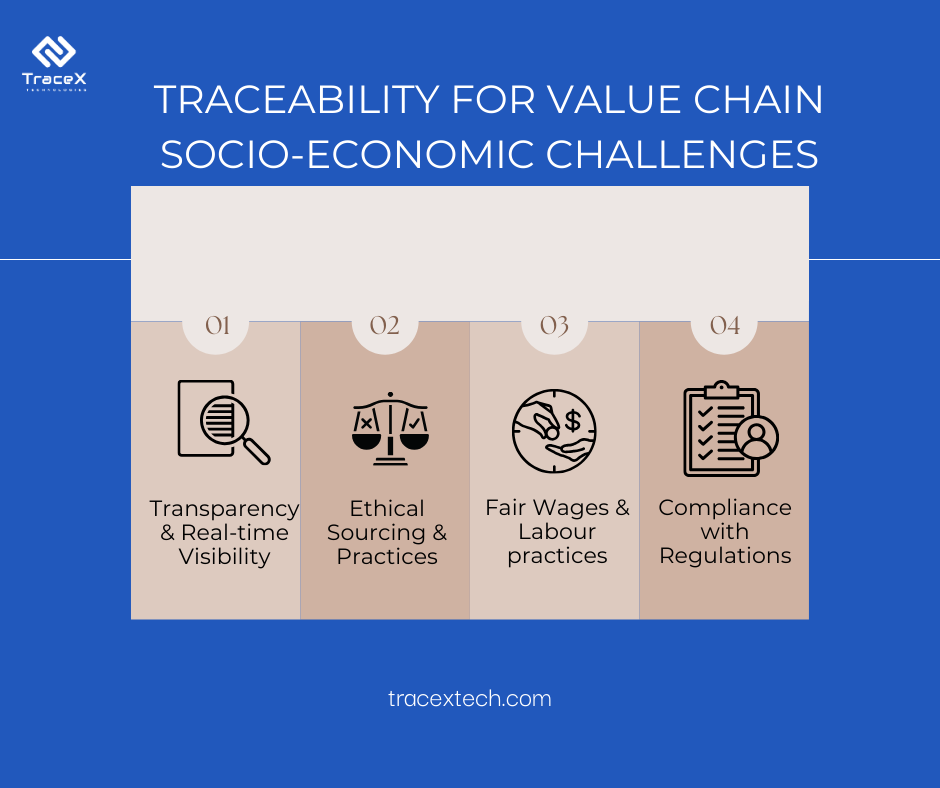Contact: +91 99725 24322 |
Menu
Menu
Quick summary: Explore the intricate socio-economic challenges faced by Turkey's Rose Market. Uncover the complexities surrounding issues like unethical labor practices, fair wages, and the impact on migrant workers. Gain insights into how these challenges affect the delicate balance between cultural heritage and economic vitality in one of Turkey's most significant industries.

In the heart of Turkey’s vibrant agricultural landscape lies the rose market, a sector that intertwines cultural significance with economic vitality. However, like many industries, the Turkey rose market faces socio-economic challenges that can impede its growth and sustainability.
Isparta, known as the “land of roses” produces 60% of the world’s rose harvest and export products all over the world.
This blog explores the transformative potential of traceability solutions in empowering Turkey’s rose market. By delving into the intricate web of challenges such as supply chain inefficiencies, quality assurance, and market competitiveness, we’ll uncover how traceability solutions pave the way for transparency, accountability, and heightened socio-economic resilience. Join us on a journey to understand how technology can be a catalyst for positive change, ensuring that the timeless beauty of Turkey’s roses thrives in a modern, interconnected world.
Turkey’s rose market is distinguished by its long history of rose growing, which is mostly concentrated in the Isparta region—often referred to as the “Rose City.” Due to its ideal climate and soil, the area is well known for producing Damask roses (Rosa damascena) of superior quality. With an emphasis on rose oil production, Turkey is a prominent player in the global rose market. Turkish rose oil, which is extracted by steam distillation from the fragrant petals, is highly prized in a number of sectors, including traditional medicine, cosmetics, and scent. Turkey’s proficiency in rose farming, particularly in Isparta, has established the nation as a major player in the international rose trade, demonstrating the industry’s cultural and financial significance.
Roses are extremely significant in Turkish culture and daily life, in addition to their exquisite scent and beauty. Roses are used as a symbol in poetry and literature, as well as in food, cosmetics, and medicine. For many years, the Turkish land and culture have been blooming with the rose, or Gul as it is known in Turkish. The Turkish people have long used rose water and oil in many ways, and they continue to do so now. The production, gathering, and handling of roses support rural livelihoods by creating jobs for the surrounding people.
The rose market in Turkey, while contributing significantly to the country’s economy and cultural heritage, faces several environmental and socio-economic challenges related to unethical labor practices, migrant issues, and fair wages. These challenges can have profound implications for the well-being of workers and the overall sustainability of the industry.
The dynamics of a rising demand and a declining supply of roses present a complex set of issues for the rose industry. The growing need for roses around the world, fueled by the fragrance, cosmetics, and floriculture industries, puts pressure on growers to keep up with demand. But this increase in demand is accompanied by a worrying trend of decreased production.
The trend in farmers’ preferences toward less labor-intensive crops is one reason behind the fall in rose production. Roses are known to be extremely labor-intensive, needing close attention to detail during both the growing and harvesting stages. This has caused some growers to choose less labor-intensive alternative crops, which could have an effect on the total amount of land used for rose farming.
An additional difficulty that comes with current cultivation areas is the aging of rose plants. Rose bushes lose some of their output as they become older, which has an impact on the quantity and quality of flowers they produce. Diseases and environmental stressors are two things that might make this productivity decline worse. It takes a substantial time and financial commitment to rejuvenate or replant old rose bushes. The way these factors interact presents a serious problem for the rose business. Strategic interventions to improve production efficiency, promote sustainable farming practices, and even investigate the introduction of newer rose types that may offer improved resistance to diseases and pests are required to meet the growing demand.
Technology plays a critical role in addressing the issues related to traceability in the rose industry. Blockchain, RFID (Radio-Frequency Identification), and IoT (Internet of Things) are examples of advanced technologies that can be used to build a digital, unchangeable record of the whole supply chain. For example, blockchain makes record-keeping safe and transparent and makes sure that every event or transaction in the supply chain is time-stamped and connected to the one before it. Precision agricultural technologies, for example, can be used to optimize cultivation methods and mitigate problems associated with infertile soils and erratic rainfall. Real-time information on crop health can be obtained using drones and satellite photography, which can also be used to pinpoint problem regions. Regarding labor-related difficulties, technology can help by automating some operations and lowering the need for manual work. One way to improve efficiency and reduce work intensity in the harvesting process is by implementing automated harvesting devices. Traceability in the rose industry starts during the cultivation phase, when information about the particular farm, planting techniques, and cultivation procedures are documented. Every stage that the roses go through, such as harvesting, processing, packaging, and shipping, is recorded. The use of pesticides and fertilizers, the times of harvest, and the routes of transportation are a few examples of this data.
Traceability solutions can bring transparency to the rose supply chain, allowing consumers and stakeholders to track the journey of roses from cultivation to market. This transparency discourages unethical labor practices by holding businesses accountable for their sourcing practices.
Implementing traceability solutions enables the verification of adherence to ethical labor practices. Certifications and labels can be attached to products, indicating that they are produced under fair and humane conditions.
Traceability solutions can help ensure fair wages by providing a platform for monitoring and verifying payment structures. This fosters accountability in the industry and contributes to improved economic conditions for workers.
Traceability solutions can assist in monitoring the rights and working conditions of migrant workers, ensuring that they are treated ethically and provided with fair wages and adequate living conditions.
Uncover the transformative power of traceability solutions, as we delve into how they are cultivating transparency, promoting fair wages, and fostering ethical labor practices.
Embark on a journey of Supply Chain Traceability
The implementation of TraceX traceability solutions emerges as a promising avenue to instill transparency, accountability, and ethical standards within the industry, ultimately fostering a more sustainable and socially responsible rose market in Turkey.

The rose industry is poised for opportunities and potential growth, with the role of traceability emerging as a key factor in ensuring its long-term sustainability. As global demand for roses continues to rise, driven by diverse sectors such as fragrance, cosmetics, and pharmaceuticals, the industry faces opportunities for expansion and increased market share. However, to capitalize on these opportunities and foster sustainable growth, traceability plays a pivotal role. Traceability, facilitated by advanced technologies like blockchain, IoT, and RFID, offers a comprehensive solution to address various challenges within the rose supply chain. One notable opportunity lies in building consumer trust and confidence through transparent and accountable practices. Traceability allows stakeholders, from producers to consumers, to access real-time information about the origin, cultivation practices, and processing methods of roses. This transparency not only enhances the credibility of the industry but also aligns with the increasing consumer demand for ethically and sustainably sourced products.
Environmental and socioeconomic concerns are also included in the role that traceability plays in guaranteeing the long-term viability of the rose industry. Traceability makes effective resource management possible by tracking and recording every step of the supply chain, from planting to distribution. Through traceability solutions, precision agriculture technology maximize water use, lessen pesticide impact on the environment, and enhance general agricultural practices. Initiatives for traceability also support socio-economic sustainability. Customers are better equipped to make educated decisions thanks to traceability’s supply chain visibility, which supports businesses that place a high priority on ethical labor standards, community service, and ecologically responsible methods. The increasing demand from consumers for socially conscious products generates a positive feedback loop that incentivizes companies to engage in ethical activities and enhances the general well-being of the communities in question.
In summary, the rose industry is poised for growth and attractive prospects due to a variety of factors, including a variety of applications across multiple sectors and rising global demand. As a revolutionary force that provides answers to problems and guarantees the industry’s long-term viability, traceability plays a crucial role. Technologies for traceability, such blockchain, IoT, and RFID, offer previously unheard-of levels of accountability and transparency as they become more and more integrated into the entire supply chain. In addition to fostering consumer confidence by providing information about the origin and methods of rose cultivation, this transparency also complies with consumers’ growing demands for products that are responsibly sourced and less harmful to the environment. Adopting traceability will help the rose business grow responsibly and robustly, addressing present issues and promoting socioeconomic sustainability and environmental stewardship.
